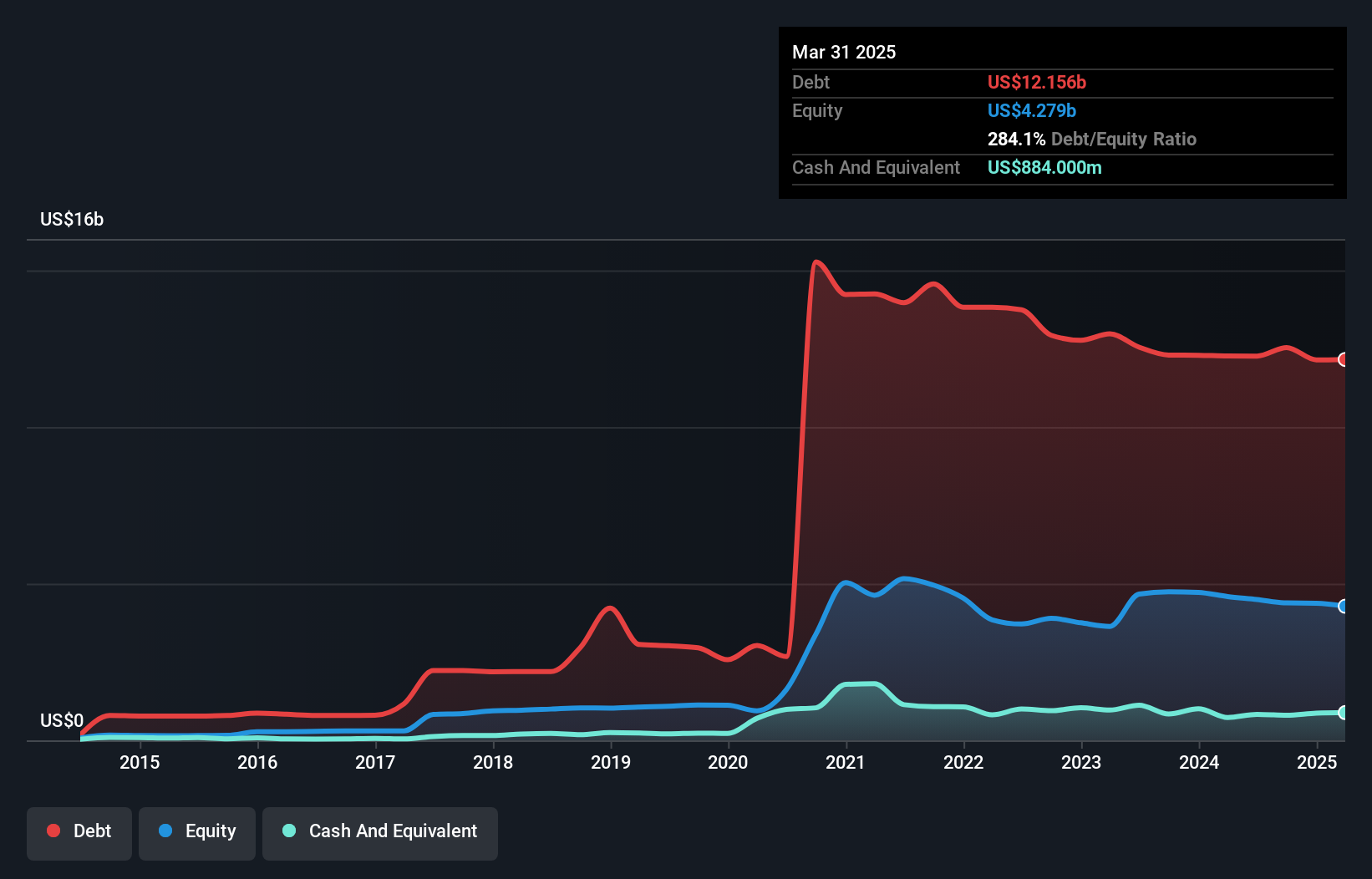These 4 Measures Indicate That Caesars Entertainment (NASDAQ:CZR) Is Using Debt In A Risky Way
Howard Marks put it nicely when he said that, rather than worrying about share price volatility, 'The possibility of permanent loss is the risk I worry about... and every practical investor I know worries about.' When we think about how risky a company is, we always like to look at its use of debt, since debt overload can lead to ruin. Importantly, Caesars Entertainment, Inc. (NASDAQ:CZR) does carry debt. But the more important question is: how much risk is that debt creating?
When Is Debt Dangerous?
Debt and other liabilities become risky for a business when it cannot easily fulfill those obligations, either with free cash flow or by raising capital at an attractive price. Part and parcel of capitalism is the process of 'creative destruction' where failed businesses are mercilessly liquidated by their bankers. While that is not too common, we often do see indebted companies permanently diluting shareholders because lenders force them to raise capital at a distressed price. Of course, debt can be an important tool in businesses, particularly capital heavy businesses. When we think about a company's use of debt, we first look at cash and debt together.
What Is Caesars Entertainment's Net Debt?
As you can see below, Caesars Entertainment had US$12.2b of debt, at March 2025, which is about the same as the year before. You can click the chart for greater detail. On the flip side, it has US$884.0m in cash leading to net debt of about US$11.3b.

A Look At Caesars Entertainment's Liabilities
According to the last reported balance sheet, Caesars Entertainment had liabilities of US$2.14b due within 12 months, and liabilities of US$26.0b due beyond 12 months. On the other hand, it had cash of US$884.0m and US$440.0m worth of receivables due within a year. So its liabilities total US$26.8b more than the combination of its cash and short-term receivables.
The deficiency here weighs heavily on the US$5.93b company itself, as if a child were struggling under the weight of an enormous back-pack full of books, his sports gear, and a trumpet. So we definitely think shareholders need to watch this one closely. At the end of the day, Caesars Entertainment would probably need a major re-capitalization if its creditors were to demand repayment.
Check out our latest analysis for Caesars Entertainment
We measure a company's debt load relative to its earnings power by looking at its net debt divided by its earnings before interest, tax, depreciation, and amortization (EBITDA) and by calculating how easily its earnings before interest and tax (EBIT) cover its interest expense (interest cover). The advantage of this approach is that we take into account both the absolute quantum of debt (with net debt to EBITDA) and the actual interest expenses associated with that debt (with its interest cover ratio).
While we wouldn't worry about Caesars Entertainment's net debt to EBITDA ratio of 3.1, we think its super-low interest cover of 0.97 times is a sign of high leverage. It seems clear that the cost of borrowing money is negatively impacting returns for shareholders, of late. More concerning, Caesars Entertainment saw its EBIT drop by 6.3% in the last twelve months. If that earnings trend continues the company will face an uphill battle to pay off its debt. When analysing debt levels, the balance sheet is the obvious place to start. But it is future earnings, more than anything, that will determine Caesars Entertainment's ability to maintain a healthy balance sheet going forward. So if you're focused on the future you can check out this free report showing analyst profit forecasts.
Finally, a business needs free cash flow to pay off debt; accounting profits just don't cut it. So we clearly need to look at whether that EBIT is leading to corresponding free cash flow. In the last three years, Caesars Entertainment created free cash flow amounting to 10% of its EBIT, an uninspiring performance. For us, cash conversion that low sparks a little paranoia about is ability to extinguish debt.
Our View
To be frank both Caesars Entertainment's interest cover and its track record of staying on top of its total liabilities make us rather uncomfortable with its debt levels. And even its EBIT growth rate fails to inspire much confidence. After considering the datapoints discussed, we think Caesars Entertainment has too much debt. That sort of riskiness is ok for some, but it certainly doesn't float our boat. Given the risks around Caesars Entertainment's use of debt, the sensible thing to do is to check if insiders have been unloading the stock.
When all is said and done, sometimes its easier to focus on companies that don't even need debt. Readers can access a list of growth stocks with zero net debt 100% free, right now.
Have feedback on this article? Concerned about the content? Get in touch with us directly. Alternatively, email editorial-team (at) simplywallst.com.
This article by Simply Wall St is general in nature. We provide commentary based on historical data and analyst forecasts only using an unbiased methodology and our articles are not intended to be financial advice. It does not constitute a recommendation to buy or sell any stock, and does not take account of your objectives, or your financial situation. We aim to bring you long-term focused analysis driven by fundamental data. Note that our analysis may not factor in the latest price-sensitive company announcements or qualitative material. Simply Wall St has no position in any stocks mentioned.
 Nasdaq
Nasdaq Wall Street Journal
Wall Street Journal